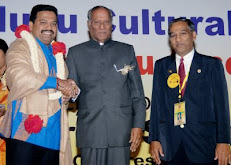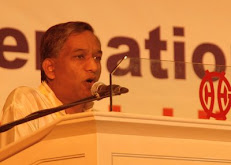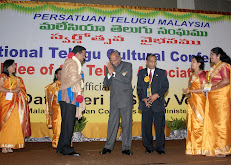The word 'Andhra' -- as a people, as a region and as a language is very ancient. The first context of Andhra people and the word 'Andhra' was recorded in the 'Aitareeya Brahmana' of the 'Rugveda', prior to 600 B.C. Vidyanathudu, the poet who belonged to the King Pratapa Rudra's court, wrote in his 'Pratapa Rudra Yashobhushanam' that the word 'Trilinga Desam' originated because of the presence of the three Saivaite temples at Srisailam, Kaleswaram and Draksharamam within this region. And, so it was believed that the word Telugu was derived from 'Trilinga'.
The tribes of Andhra mingled with Naga, Yaksha, and Dravida tribes of Vindhya mountains who were already living there then,and hence Telugu, Tamil and Kannada became the Dravidian languages. Rayalaseema was the first settlement of 'Tenugu' people and the word 'Tenugu' was later transformed into 'Telugu'. From 'Telugu' words like "Telagalu", "Telangana", "Telanganyulu" (a subset of Andhra Brahmins) , and "Teligiri" originated. 'Tenugu' is the meaning for those who travel towards south. In Tamil and Kannada "ten" means south side.
Though the inscriptions of the 7th century AD are in Telugu, it was Nannayya around 1030 AD, who brought about a revolution in Telugu by translating two and a half cantos of Mahabaharata. In translating the Sanskritic element, he showed a unique gift in synthesising the Sanskritic art with telugu and also in raising the dignity and beauty of the language. And from here Telugu leaped into the Pre-Prabanda age, the Prabandha age and then into the modern period of Telugu literature.
The script of Telugu is by itself beautiful and artistic. Telugu, with its profuse use of vowels and fine words ending with Na and La is an apt medium for the conveyance of Carnatic musical expression and melody. Hence, non-Telugu musicologists prefer to compose and sing in Telugu.
In its long journey, Telugu, the second most spoken language in India, has assimilated many foreign words and gained its distinct identity in the fields of teaching, science, medicine and engineering to name a few.
Source: Internet



.jpg)
.jpg)
.jpg)
.jpg)
.jpg)


No comments:
Post a Comment